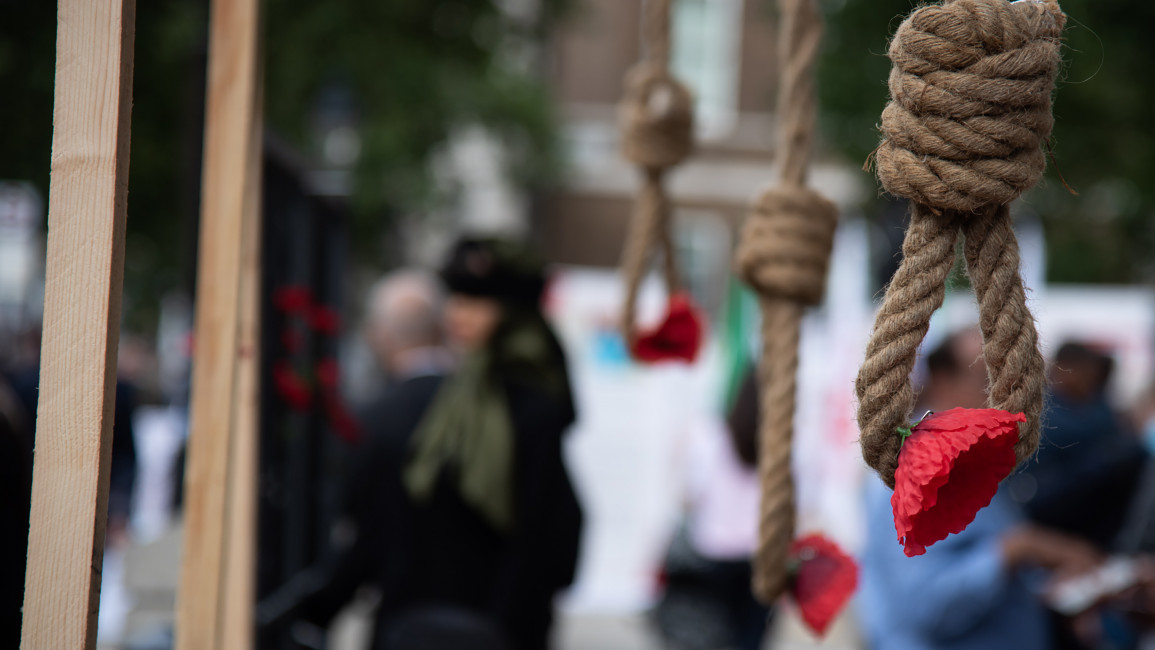Iran witnessed 'significant surge' in drug-related executions in 2022: report
The number of executions for drug-related offences in Iran, as well as globally, has increased dramatically in 2022, with Iran responsible for the largest number of executions.
Nine out of ten executions for drug-related crimes took place in Iran, the drugs policy reform NGO Harm Reductional International (HRI) revealed in the report, with 44 percent of all death penalty cases handed out for such offences.
Globally, HRI recorded at least 285 executions for drug-related offences in 2022 - a 118 percent increase from 2021 and an 850 percent increase from 2020.
Figures by the Abdorrahman Boroumand Centre for Human Rights in Iran - one of few independent organisations monitoring and reporting on capital punishment in the country - revealed a staggering 92 percent increase in confirmed drug-related executions between 2021 and 2022.
The NGO also said that people belonging to marginalised ethnic or socioeconomic groups were disproportionately affected by the death penalty.
In Iran, 40 percent of those executed belonged to the minority Baluch ethnic group, who live in the southeast of the country, close to the Pakistan and Afghan borders, but only represent two percent of the population.
Expert Roya Boroumand told HRI: "The disproportionate use of the death penalty against Iran’s Baluchi minority epitomizes the entrenched discrimination and repression they have faced for decades and further highlights the inherent cruelty of the death penalty."
More than 2,000 people were allegedly on death row in Iran in 2022, with the real number expected to be higher.
Overall, the country witnessed an uptick in capital punishment that year due to protesters - following the death of 22-year-old Kurdish Iranian Mahsa Amini - given the death penalty as punishment.
Despite the huge number of numbers for executions reported in Iran, this should still be approached with "great precaution", HRI said, as transparency in the country is "restricted" and the real figure is likely far higher.
There are 35 states worldwide, including Iran, that impose capital punishment for drug offences.
Executions are typically applied for cultivation and manufacturing, and the smuggling, trafficking, or importing and exporting of controlled substances.
However, some states will issue the death penalty for less punishable offences, such as possession, hiding drugs, financing drug offences, as well as inducing or coercing others into using drugs.
Other than Iran, countries that issue the death penalty on a large scale include Saudi Arabia, Singapore, Malaysia, China, and Vietnam.
Fifteen percent of executions in the Gulf kingdom were drug-related in 2022, with at least half of the victims being foreign nationals, namely from Syria, Yemen, Jordan, and Pakistan.
Other Gulf countries also witnessed an increase in the death penalty for drug-related crimes last year, notably in the UAE and Kuwait.
The latter handed death sentences last year to individuals accused of trafficking. The victims were notably foreign nationals, from Iran and India. In the UAE, three people received death sentences for such offences.
It comes amid a spate of captagon exports to Gulf states from Syria and Lebanon but there are huge concerns about the judicial processes in these countries.
The NGO said that international actors are "not doing enough" to halt the surge in executions worldwide, with reactions being "largely symbolic".


![Minnesota Tim Walz is working to court Muslim voters. [Getty]](/sites/default/files/styles/image_684x385/public/2169747529.jpeg?h=a5f2f23a&itok=b63Wif2V)




![Israeli officials are considering exiling Yahya Sinwar to Sudan as part of a deal to end the war [Getty]](/sites/default/files/styles/image_330x185/public/1251837582.jpeg?h=127ba027&itok=ujxSRy_f)
![Debris near Rafic Hariri International Airport [Getty]](/sites/default/files/styles/image_330x185/public/2176162423.jpeg?h=a5f2f23a&itok=MCSK9mkM)
![An Israeli air strike on Jabalia killed teenage journalist Hassan Hamad [Screengrab/X]](/sites/default/files/styles/image_330x185/public/2024-10/hassan%20hamad1.jpg?h=c12e0b96&itok=Rd_dyCVp)